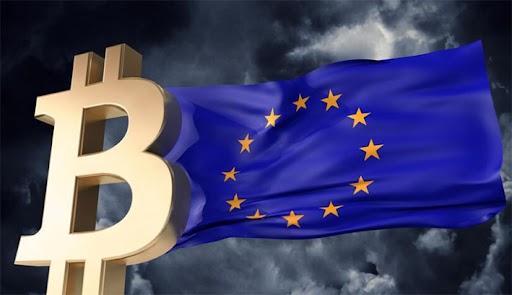As the crypto industry continues to evolve and face regulatory challenges, crypto companies are seeking alternatives to the United States’ uncertain regulatory landscape and offshore options. Amidst this quest for clarity and stability, Europe’s Crypto emerges as a promising destination for crypto businesses. Despite its own set of regulations, Europe offers a level of regulatory clarity that can provide a reliable roadmap for navigating the stormier bear market.
Coin Base’s National Ad Campaign Highlights Urgency for Regulatory Clarity in the US
Coinbase, one of the leading cryptocurrency exchanges, has launched a national ad campaign titled “Moving America Forward.” The campaign aims to educate millions of viewers. Including those tuning in to watch the NBA Finals, about cryptocurrencies and their potential to update the existing financial system. By running this campaign, Coinbase is putting pressure on the United States Securities and Exchange Commission (SEC) to provide clear regulatory guidelines for digital assets. The company believes that regulatory clarity is crucial for the growth and development of the crypto industry in the US.
Crypto Companies Seek Alternative to US Regulations and Offshore Options
While Coinbase makes its case for regulatory clarity in the US. Many crypto companies are exploring alternatives beyond the country’s borders. The high costs associated with advertising and lobbying, along with the desire to avoid the offshore label. They have led these companies to search for jurisdictions that offer favorable regulatory environments. Europe has emerged as a viable option, providing a balance between regulatory oversight and clarity. As uncertainty looms in the US, crypto businesses are considering Europe as a potential hub for expansion and innovation.
Europe Emerges as a Viable Destination for Crypto Companies
Following the seismic shift caused by Brexit, Europe has turned its attention to technology, including cryptocurrencies. The continent’s parliament has introduced the Markets in Crypto-Assets (MiCA) legislation, which became effective this year. Despite its imperfections and potential room for improvement, MiCA brings a level of regulatory certainty that crypto companies find attractive. Countries like France are positioning themselves to welcome companies operating under these new regulations, offering a supportive environment for crypto-related ventures.
Europe’s MiCA Legislation and Its Impact on the Crypto Sector
MiCA, introduced in September 2020, provides a regulatory framework for crypto-assets in Europe. While it brings clarity, some aspects of the legislation have raised concerns within the crypto community. For instance, MiCA mandates wallet restrictions, including the “Travel Rule” for hosted or custodial wallets. Exchanges and wallet providers must obtain licenses and document the details of transactions, regardless of their size. However, noncustodial players still have room to operate within Europe’s regulatory landscape, aligning with the European mindset of responsibility and risk mitigation. Furthermore, Europe maintains a dedicated sandbox for crypto initiatives, fostering experimentation and innovation.
Hosted vs. Noncustodial Wallets: Navigating Europe’s Regulatory Landscape
One key aspect of Europe’s regulatory framework is the differentiation between hosted or custodial wallets and noncustodial wallets. While MiCA imposes stricter regulations on custodial wallets, noncustodial players have more flexibility in their operations. This aligns with the European mindset that emphasizes taking responsibility for someone’s assets. However, it’s important to note that data, including personal information, is subject to its own set of regulations, such as the General Data Protection Regulation (GDPR). Despite some tracking requirements, Europe’s approach aims to strike a balance between regulation and mainstream adoption of cryptocurrencies.
Embracing GDPR and Evolving Web3 Tech: Balancing Data Protection and Crypto Innovation
In Europe, data protection is a significant consideration within the crypto industry. GDPR, a comprehensive data protection regulation, sets guidelines for handling personal data. While tracking data might appear incongruent with the ethos of decentralization and privacy that cryptocurrencies champion, it represents a step towards mainstream adoption and regulatory compliance. Moreover, Web3 technologies are evolving to address GDPR blind spots, offering innovative solutions that prioritize user privacy while ensuring compliance with data protection regulations.
Europe’s Sandbox for Crypto Initiatives: Fostering Innovation and Experimentation
Europe recognizes the importance of fostering innovation in the crypto space. To encourage experimentation and nurture new ideas, the region has established dedicated sandboxes for crypto initiatives. These sandboxes provide a controlled environment where startups and companies can test their products and services, ensuring compliance with regulatory requirements while allowing room for innovation. Switzerland, in particular, stands out as a hub where large financial institutions are discreetly entering the crypto space, further enhancing Europe’s position as a favorable destination for crypto ventures.
Regulatory Clarity as a Catalyst for Europe’s Growing Crypto Market
One significant advantage that Europe offers to the crypto industry is regulatory clarity. In an industry characterized by volatility and rapid developments, clear regulations provide a sense of stability and confidence to businesses and investors. The well-regarded regulatory frameworks found in mature European markets, such as Switzerland, act as reliable on- and off-ramps for the crypto community. By ensuring straightforward pathways to enter and exit the market, Europe becomes an attractive choice for crypto companies seeking a solid foundation for their operations.
European Expansion: Accessing New Markets and Ensuring Reliable On- and Off-Ramps
Expanding into Europe not only offers regulatory advantages but also provides access to new markets. While certain markets may have reservations about services based in offshore jurisdictions, European expansion offers the opportunity to tap into a broader customer base that may be more inclined to trust services operating within regulated European jurisdictions. Reliable on- and off-ramps are essential for the crypto ecosystem’s healthy and profitable functioning. Europe’s established financial infrastructure and robust regulatory frameworks make it an appealing destination for crypto companies looking to broaden their reach and enhance their market presence.





















